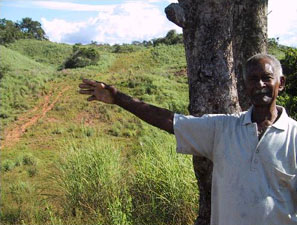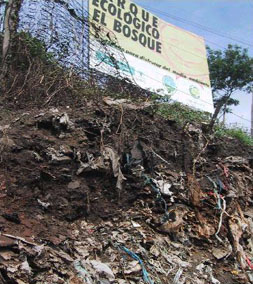The farms in the north east of Antioquia are wonderfully productive. It is not unusal to find a peasant proudly listing the twenty or thirty different types of fruit he cultivates on his land. And around there it also a mining region, with gold deposits streaking under the rolling hillsides.


After decades of struggle, the peasants had by the 1980s established titles to their land, they had a fairly settled life, their families were growing. But their land was on the export route between the oilfields in central and eastern Colombia, and the outlets to the US and European markets. And driven on by the neoliberal mantra, the Colombian government was desperate for export earnings. It was ready to do everything it could to help BP and the other multinationals transport their oil cheaply to market. The peasants’ lands stood in the way of ëProgress’. And Progress moved very fast. Without bothering with environmental impact studies, the state oil corporation completed the first pipeline in 1991.
The damage grew progressively worse. As the disruption to water courses accumulated, mudslides avalanched down onto the farms, wells dried up, springs were covered over and the streams died. Where before there was running water, the land became a boggy mess. The cows got caught in holes and couldn’t get out. Other animals ate away at the pipeline’s restraining sacking, which choked them to death. The peasants got a deputy to raise their complaints in Antioquia’s assembly.
But this was not enough Progress. A second pipeline was needed to transport the oil from BP’s massive new oilfields. It was already clear the type of damage that would be caused, unless appropriate preventative and remedial action was taken, which would cost. The peasants made it clear they did not want the second pipeline. When the earthmoving equipment arrived they mounted a day and night protest blockade. It took the army to clear them.
The army unit posted to guard the pipeline violated the local population. A woman was raped, but in Colombia there is impunity for such crimes against the people.
The displaced peasants now live in absolute poverty. ‘When we arrived we had no money, my sister helped us a bit. There is more than 80% unemployment here – we can’t get work.’
‘I have a back problem, I hurt it rescuing a calf from a hole. It is very painful, so I can’t work now. But the operation would cost £600.’
‘My daugther is 13 years old. She is out selling on the streets. I can’t tell you how worried I am.’
It is not hard to summarise the peasants’ feelings. They have an all embracing nostalgia, and a sense of bereavement for the land and the way of life that they have lost. They want their land back, they want their lives back. They deserve justice.
COLOMBIA PIPELINE VICTIMS DEFENCE FUND
There is an urgent need to support the victims. Their cases have been held up for several years in Colombia’s interminable legal system as the multinational’s OCENSA/ODC consortium put in one blocking move after another. Meanwhile the victims are in need of health care, food and welfare as well as financial support for their legal defence. All donations will be put to supporting the victims and their claim. Make payable to "Colombia Solidarity Campaign" and write on the back "CPV Defence Fund" and send to our address below.
For more information contact
Colombia Solidarity Campaign.
colombia_sc@hotmail.com
tel: 07950 923 448
Post: PO Box 8446, London N17 6NZ

